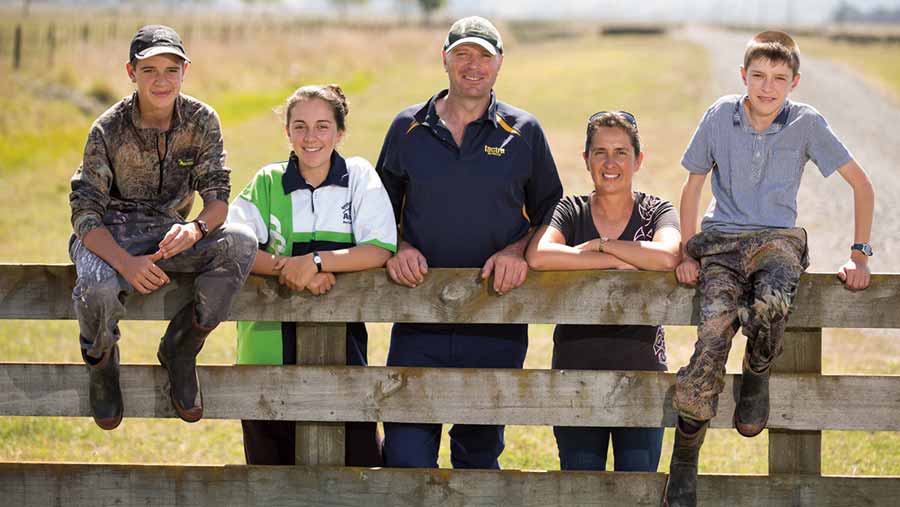New Zealand farming: Living the dream, despite the weather
 The Hadfield family
The Hadfield family The View From Here is our new series where farming women give an insight into rural life around the world.
Over the coming weeks, we’ll be visiting countries around the globe to get a sense of the joys and challenges of life in the countryside.
Here Nuku Hadfield in New Zealand answers our questions.
What sort of farm do you live on?
Our farm is 1,500ha of hill country on the East Coast of the North Island.
It ranges from 200-600m above sea level. We have 6,200 Romney ewes, 1,800 replacement ewe hoggets, 70 rams, 400 Angus breeding cows and 400 mixed-age replacement heifers.
Annual rainfall is between 1,700 and 1,800mm. We fatten and kill 5,000-6,000 lambs, with the remainder being sold store. Our normal lambing percentage is 145% (at the tail-docking stage).
How involved are you with the farm?
Very. My husband and I work as a team using our strengths in different areas. I take care of all the finances and the administrative side, while he is in charge of the day-to-day stocking decisions. We have a full-time shepherd who works alongside him.
I am out on the farm a couple of times a week; more so during the busier times such as docking and shearing. I have one dog and generally ride a horse when I do jobs. Our business is a partnership and we make all major decisions together.
What’s the farming/countryside typically like in your area?
It’s medium to steep hill country. All farms in our area are sheep and beef.
We are high enough that we get three to four snowfalls a year. In summer, the temperature can climb above 30C.
Most farms have some native bush on them and so there is plenty of opportunity to catch a wild pig or a deer. Hunting is a big hobby for people. Possums are a pest (they’re not native) and plenty of kids make pocket money by shooting and plucking them, making $100/kg of fur (£55).
How poor or prosperous are farming families in your country?
Generally farming families have a very good standard of living.
Agriculture is still New Zealand’s biggest export and there is plenty of room for growth.
Farming is not just a job, but also a lifestyle and we are very fortunate to live and work in such a great country.
What’s the best thing about living on a farm?
It’s that our home is also our workplace. We have been able to bring up our children with them knowing about – and being part of – what we do. They see what we do to provide for them and it becomes second nature to them.
Being self-employed gives us the power to determine our own future. Farming is our passion; I can truly say we are living the dream.
See also: ‘What’s in Your Shed?’ visits New Zealand
What’s the worst thing about living on a farm?
Probably the weather. We lamb outside and prepare as best we can by ensuring the stock is in the right condition, using genetic selection to ensure survival traits and providing adequate shelter.
But if a storm hits and we are in the middle of lambing, no one can control mother nature and we just have to ride it out. It’s the same in the summer with a drought. We have learned it is about planning and making quick decisions if a problem arises.
What’s the single biggest challenge farmers face where you are?
Other than adverse weather, it is the price we receive for what we produce. What we get at the farmgate needs to be more as production costs have risen.
We are fortunate in our business that we have volume and this offsets it. When the prices are higher, it has positive spin-off benefits for the whole community, as farmers spend more.
What makes you laugh?
Watching a good comedy, such as The Big Bang Theory and catching up with family – we always have each other on, which always guarantees a good laugh!
What makes you angry?
As we live in an isolated area, getting services here can be a problem. For example, we only have a landline as there is no cell phone coverage. Recently our phone went out for 12 days.
Urban people can also be quick to criticise farmers over environmental issues and yet most farmers are caretakers, not destroyers, of the land.
Is there equality between the sexes in your country?
My husband and I are a team, he has his areas he’s in charge of, and I have mine. This makes our business efficient and effective. All major decisions are made jointly.
More woman are taking on roles in agriculture and there is a lot more acceptance of woman in challenging physical roles, too.
There is still the odd old fella who will talk about “Bart’s Farm” or “Bart’s sheep” instead of “Bart & Nuku’s”, but I think they are a dying breed. When we hire anyone for casual work, it is always based on ability, not gender.
Is farming well supported by your government?
Generally, yes. We do not receive any financial subsidies or assistance, but we have not found any of their policies have impeded our business.
Tell us something about yourself not many people know.
I have a scar on my foot where a sheep kicked a handpiece and the comb dug into my foot and stuck my foot to the board of the wool shed. I was nine years old and was rousing in bare feet for my dad.
He wrapped a bandage around it to stop the bleeding and then said: “Don’t tell your mother.” Like she wouldn’t notice a hole in my foot!
If you’re farming outside the UK and would like to be considered for this series, email fwfarmlife@rbi.co.uk
